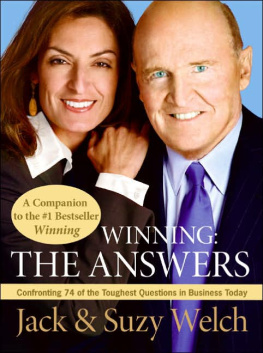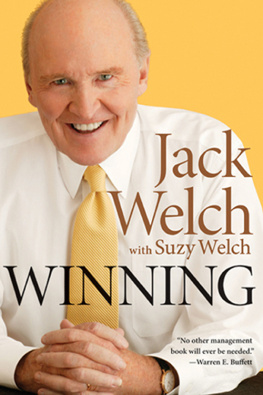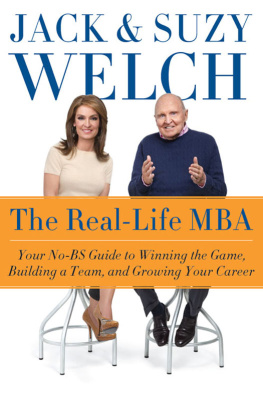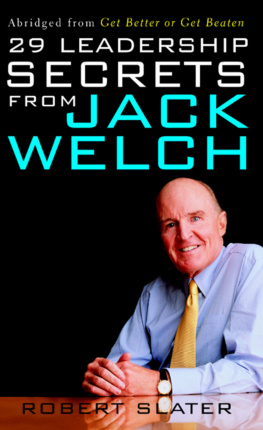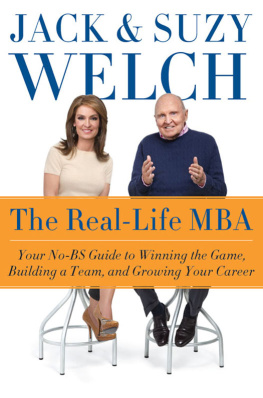WINNING The Answers
CONFRONTING 74 OF THE TOUGHEST
QUESTIONS IN BUSINESS TODAY
Jack & Suzy Welch

CONTENTS
Introduction
GLOBAL COMPETITION
On the Brave New World
1. Taking on Chinaand Everyone Else
2. Is China for Everyone?
3. Regarding Russia
4. Why Paris Burned
5. Vive lEuropeJust Not Yet
6. Outsourcing Is Forever
7. Getting Global Before It Gets You
8. The Home Field Advantage
LEADERSHIP
On Being a Better Boss
9. Are Leaders Born or Made?
10. The Leadership Mind-Set
11. Tough Guys Finish First
12. The Ultimate Values Test
13. When to Cut the Cord
14. The Courage to Become a Change Agent
15. Wrestling with Resisters
16. Building Trust from the Top Down
17. The Perilous Promotion Trap
18. Keeping Your People Pumped
19. How to Get Elected Boss
20. Winning the Whining Game
21. New JobOld Team?
22. The Smarter They Are
MANAGEMENT PRINCIPLES AND PRACTICES
On Running a Business to Win
23. Getting the Best People
24. The Fight Against Phoniness
25. The Limits of Candoror Not
26. The Case for DifferentiationEven in Sweden
27. Strategy for Big and Small Alike
28. The Consultant Conundrum
29. The Danger of Doing Nothing
30. How Healthy Is Your Company?
31. The Real Job of HR
32. Staff Functionariesand Other Filters
33. Stopping Job Cuts Before They Happen
34. No More B.S. Budgeting
35. Not Invented Where?
36. Making Sense of Matrixes
37. The Uses and Abuses of Gut Instinct
38. What Becomes a Salesperson Most
39. The Slippery Slope of Open Books
40. Preventing a Corporate Katrina
41. Whats Holding Women Back
42. Paying Big-Time for Failure
CAREERS
On Life, Liberty, and the Pursuit of a Promotion
43. What Should I Do with the Rest of My Life?
44. Picking the Right Path
45. I Am Who I Am
46. Does an MBA Really Matter?
47. Dear Graduate
48. Big Company or Start-up?
49. It Starts with Self-Confidence
50. The Truth About Mentoring
51. The Bad Boss No-Brainer
52. Weve Just Been Acquired and I Hate It
53. From Hero to Zero
54. Am I an Entrepreneur?
55. A Case of Embedded Reputation?
56. Why Cant I Get Hired?
57. Theyre Telling You Something
58. Welcome to the Government, Kid
59. Knowing When to Fold Em
60. Are You a Boss Hater?
61. Looking for a Second Act
62. Can You Hear It?
PRIVATELY HELD
On Working for the Family
63. But What About Tomorrow?
64. The Nitty-Gritty on Nepotism
65. The Consequences of Cashing Out
66. Bringing the Outside In
WINNING AND LOSING
On Why Business Is Good
67. The Wages of SOX
68. The Cocktail Party Conspiracy Theory
69. What to Tell the Grandchildren
70. Good-Bye, Genghis Khan
71. And the Losers Are
72. Whats Right About Wal-Mart
73. The Real Verdict on Business
74. What Do You Call Winning?
About the Authors
Credits
Cover
Copyright
About the Publisher
I n April 2005, we published a book called Winning . To our minds, its purpose couldnt have been more straightforward: we wanted to codify our thinking about the myriad insightful, probing, and often urgent questions we had received while traveling around the world for three years, speaking to hundreds of thousands of people about their work, career, and life challenges. We wanted, basically, to write a book that was both a philosophical treatise on fundamental business principles and gritty how-to manual in one, and in doing so, pretty much wrap up what had felt like a great, extended conversation.
Little did we know that Winning wouldnt wrap up anythingjust the opposite!
There was the book tour, of course, and you expect some action doing thatyoure out looking for it! But along with the usual TV and radio appearances, we also visited thirty-seven business schools across the United States and in Europe, and spoke to more than one hundred business groups in cities around the world. Winning , we quickly discovered, wasnt the Hmm, very well then, thank you summary event we had anticipated. It was a Hey, wait a minute, what about kind of affair.
Winning , in essence, proved to us once again that people have an insatiable thirst to talk about work. They want to understand it better, debate its every nuance, and find a way to do it better. Even after the book tour ended, the questions kept coming.
In the past year alone, we have heard several thousand questions. It is an understatement to say the topics run the gamut. There is the very macro, as in, How can developed nations compete with China? and What is the role of Wal-Mart in society? And the very micro, as in, How do I overcome my fear of public speaking? and How do I manage the team I was a part ofuntil yesterday? An IT manager in Michigan asked us about the future of the European Union, and a CEO from New Jersey asked us to list the most important characteristics to look for when hiring a sales force. Hundreds of people have asked about how to get ahead in their careers, dozens about surviving a difficult boss, and two about the appropriate use of candor with elderly workers. Weve heard from scads of employees at family-owned companies frustrated with an incompetent aunt or cousin at the helm, or otherwise at the end of their rope with nepotism. In a letter filled with poignancy, a recent college graduate from South Africa asked us how to acquire self-confidence. She said she was starting from zero. In another filled with bittersweet reflection, a British correspondent asked us how he could regain his, which hed lost after being fired for poor performance. Some letters have been amusing, like the one from the Indonesian manager who asked us how she could stop her team from explaining all their decisions with the excuse It was gut instinct! And others dead serious, like the one from the Milwaukee engineer who said, The time has come for me to advise my grandchildren what to do with their lives. So, what is the next big thing out there?
Indeed, there has been so much give-and-take since Winning s publication that weve often been reminded of what a Dutch entrepreneur told us during a visit to Amsterdam in 2002. Every day in life, she said, there is a new question.
She was more right than we could have ever predicted!
About a year ago, we realized that we had actually fallen in love with the continuing conversation sparked by Winning . For two people who get a kick out of talking and meeting people, it was pure fun. But more than that, it was fascinating. With every new encounter, we learned what peopleyoung, old, and in betweenworking in completely different kinds of businesses and in vastly different parts of the world, cared about most passionately. We learned that in Africa, for most people, its about starting anew. People are desperate to find ways to launch companies and careers; they dream of breaking out of the survivalist lifestyle. In more developed nations, the concerns more commonly come from deeply dug trenches, with questions like, How do we take the nonsense out of the budgeting process? and What can we do to make our HR department more effective?
The continuing conversations after Winning also pushed us to delve into our own thinking more deeply and to explore more than a few business and career issues that we hadnt included in the book. Both were mind-expanding activities, to say the least. And finally, opportunities to talk to global audiences that followed Winning allowed us to keep spreading a message we think isnt proclaimed nearly enoughthat business is the great engine of society. It creates jobs, pays taxes, and opens up economic opportunity like no other institution. Yes, government plays a huge supporting rolewe couldnt live in a civilized world without its services. But with its ability to provide for families, build careers, and give back, business, we believe, is the foundation of a thriving world.

